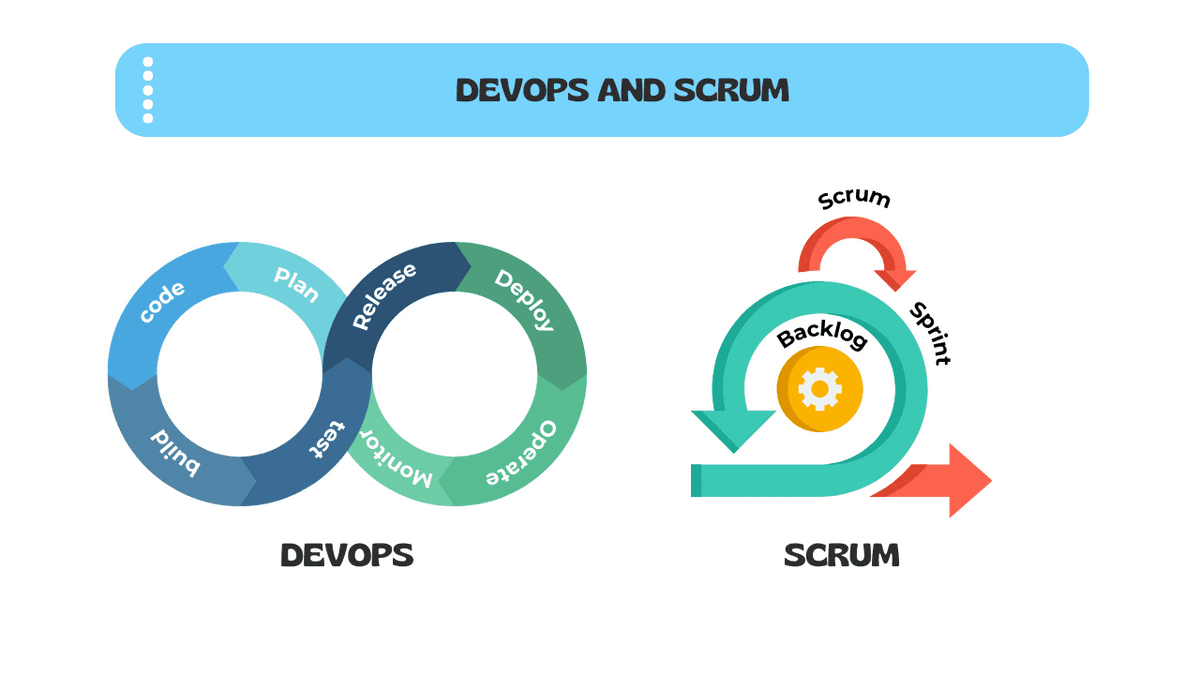
DevOps and Scrum for Enhanced Agile Development
 DevOps and Scrum for Enhanced Agile Development
DevOps and Scrum for Enhanced Agile Development
Welcome! If you're here, you're probably curious about DevOps and Scrum.
Maybe you've heard of them, but you're not quite sure what they are or how they work together.
Well, you're in the right place!
In this article, we're going to dive deep into the world of DevOps and Scrum, and explore how these two methodologies can be integrated to supercharge your software delivery process.
Table Of Contents-
Understanding DevOps and Scrum
 Understanding DevOps and Scrum
Understanding DevOps and Scrum
Let's start with the basics.
DevOps is a set of practices that combines software development (Dev) and IT operations (Ops).
It aims to shorten the system development life cycle and provide continuous delivery with high software quality.
On the other hand, Scrum is an agile framework for managing knowledge work, with an emphasis on software development.
It's designed for teams of three to nine members, who break their work into actions that can be completed within time-boxed iterations.
But wait, there's more!
There are some common misconceptions about DevOps and Scrum that we need to clear up.
Some people think that DevOps is a job title or a team, but it's not.
It's a culture, a movement, a philosophy.
Similarly, Scrum is not a methodology, but a framework.
It doesn't provide detailed instructions on what to do, but offers a structure and principles to guide you.
The Synergy between DevOps and Scrum
Now that we've got the basics down, let's talk about how DevOps and Scrum can work together.
You see, Scrum and DevOps are like two sides of the same coin.
They both aim to deliver high-quality software quickly, but they approach it from different angles.
💡
Scrum focuses on the process of creating software, while DevOps focuses on the process of deploying and maintaining it.
When you integrate DevOps and Scrum, you get the best of both worlds.
You get the structure and discipline of Scrum, combined with the speed and automation of DevOps.
This can lead to faster delivery times, fewer errors, and happier customers.
But don't just take our word for it - in the next section, we'll show you how to integrate DevOps and Scrum in your own team.
So stay tuned!
Integrating DevOps and Scrum
So, how do we bring together the worlds of DevOps and Scrum?
It's all about creating a culture of collaboration and shared responsibility.
-
Start with a Shared Vision: The first step in integrating DevOps and Scrum is to ensure everyone is on the same page. This means having a shared understanding of what you're trying to achieve and why it's important.
-
Foster a Collaborative Environment: DevOps is all about breaking down silos, and Scrum is all about teamwork. By fostering a collaborative environment, you can encourage your team to work together to solve problems and deliver high-quality software.
-
Implement Agile Practices: Scrum is an Agile framework, and many of its practices align well with DevOps. This includes things like iterative development, continuous feedback, and regular retrospectives.
-
Automate Where Possible: One of the key principles of DevOps is automation. By automating repetitive tasks, you can free up your team to focus on more important things, like delivering value to the customer.
-
Continuous Improvement: Both DevOps and Scrum are all about continuous improvement. This means regularly reflecting on what's working, what's not, and how you can improve.
Remember, integrating DevOps and Scrum is not a one-time event, but a journey.
It requires ongoing effort and commitment from everyone on the team. But with the right approach, you can create a powerful synergy that delivers real results.
Role of Scrum in a DevOps Culture
Scrum plays a crucial role in a DevOps culture.
It provides a structured approach to software development, with clear roles, events, and artifacts.
This structure can be incredibly beneficial in a DevOps environment, where the goal is to deliver software quickly and reliably.
-
Promoting Collaboration: Scrum encourages close collaboration between different roles and functions. This aligns perfectly with the DevOps principle of breaking down silos and promoting cross-functional collaboration.
-
Iterative Development: Scrum's iterative approach to development fits well with the DevOps focus on continuous delivery and integration. Each sprint provides an opportunity to deliver new features and get feedback from users.
-
Continuous Improvement: Scrum's emphasis on retrospectives and continuous improvement complements the DevOps culture of learning and adaptation. Teams can use these opportunities to identify bottlenecks, improve processes, and enhance their skills.
-
Flexibility and Adaptability: Scrum is designed to handle changes. In a DevOps environment, where the pace of change is fast, this flexibility is a significant advantage.
In essence, Scrum provides a solid foundation for implementing DevOps practices.
It promotes the right mindset and provides a framework that teams can use to organize their work and continuously improve.
Role of DevOps in a Scrum Environment
Just as Scrum plays a vital role in a DevOps culture, DevOps also brings significant benefits to a Scrum environment. Here's how:
-
Enhancing Collaboration: DevOps encourages a culture of shared responsibility. In a Scrum team, this can lead to better collaboration between developers, testers, operations staff, and anyone else involved in the software delivery process.
-
Accelerating Delivery: DevOps practices like Continuous Integration and Continuous Delivery can help Scrum teams deliver software more quickly and reliably, making it easier to meet the goals of each sprint.
-
Improving Quality: By automating testing and deployment processes, DevOps can help improve the quality of software delivered by Scrum teams. This means fewer bugs and more stable releases.
-
Facilitating Feedback: DevOps emphasizes the importance of monitoring and feedback in the software delivery process. This can provide Scrum teams with valuable insights that can be used to improve future sprints.
In a nutshell, DevOps can supercharge a Scrum environment, helping teams deliver better software more quickly and with fewer headaches.
Challenges in Integrating DevOps and Scrum
While integrating DevOps and Scrum can bring significant benefits, it's not without its challenges. Here are some common hurdles teams might face:
-
Cultural Resistance: Changing the way people work can be difficult, and there may be resistance to adopting new practices and mindsets. It's important to communicate the benefits clearly and provide adequate training and support.
-
Lack of Skills: DevOps and Scrum both require specific skills and knowledge. Teams may need to invest in training or hire new staff to fill any gaps.
-
Complexity: Integrating DevOps and Scrum can add complexity to the software development process. Teams will need to find ways to manage this complexity without slowing down delivery.
-
Tooling: DevOps relies heavily on automation, which requires the use of specific tools. Teams may need to invest in new tools and learn how to use them effectively.
Despite these challenges, the benefits of integrating DevOps and Scrum are well worth the effort.
With careful planning and execution, teams can overcome these hurdles and reap the rewards of a more efficient and effective software delivery process.
Conclusion
Integrating DevOps and Scrum can seem like a daunting task, but the benefits it brings to your software delivery process are immense.
By fostering a culture of collaboration and continuous improvement, you can supercharge your team's productivity and deliver high-quality software more quickly and reliably.
Remember, this integration is not a one-time event, but a journey. It requires ongoing effort, commitment, and adaptation.
But with the right mindset and approach, you can successfully bring together the worlds of DevOps and Scrum and create a powerful synergy that delivers real results.
So, are you ready to take the plunge and start integrating DevOps and Scrum in your team?
We hope this article has given you the knowledge and confidence to get started.
Good luck on your journey!
Frequently Asked Questions (FAQs) / People Also Ask (PAA)
Does DevOps fall under the Scrum or Agile methodologies?
Is DevOps considered superior to Agile?
Does DevOps incorporate Agile principles?
What are the origins of DevOps?
How can one apply Scrum principles using Azure DevOps?